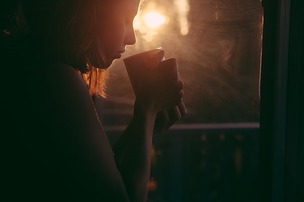
If you are generally happy and active in the summer but lack energy and feel down during autumn and winter it is likely you are suffering from Seasonal Affective Disorder. Also known as SAD, it can affect around 5 per cent of the population and a further 15 plus per cent can suffer what is called 'the blues' (a less severe form).
Causes
The reduction in sunlight during autumn and winter has a negative effect on the body and emotions. The production of a chemical in the body called Serotonin is reduced and of another body chemical, Melatonin, increased.
Serotonin affects our moods (makes us feel positive); our appetite and helps transmits messages between nerve cells (reduced transfers results in down feelings).
Melatonin affects our sleep patterns. When it is dark more Melatonin is produced making us feel sleepier. Some people are known to have higher levels of Melatonin in winter.
Treatments
If you have noticed that you get depressed as winter arrives I'd advise that you talk to your GP. For serious cases medication may be prescribed. Your GP may also suggest that you purchase a 'light box'. This is not available on the NHS but exposure to the intensive light produced has been shown to help in most cases.
You may also want to consider working with a counsellor to sort out any underlying issues such as anxiety or previous negative experiences. By taking control over these issues you reduce the depressive effect they may have.
Although it may be difficult (because of the lethargy you may feel) when suffering from SAD, it is also recommended that you increase your amount of physical activity; get out into the open as much as you can; eat more fruit and vegetables and try to socialise more. If you're lucky a break in a sunny climate during the winter can also help.
The reduction in sunlight during autumn and winter has a negative effect on the body and emotions. The production of a chemical in the body called Serotonin is reduced and of another body chemical, Melatonin, increased.
Serotonin affects our moods (makes us feel positive); our appetite and helps transmits messages between nerve cells (reduced transfers results in down feelings).
Melatonin affects our sleep patterns. When it is dark more Melatonin is produced making us feel sleepier. Some people are known to have higher levels of Melatonin in winter.
Treatments
If you have noticed that you get depressed as winter arrives I'd advise that you talk to your GP. For serious cases medication may be prescribed. Your GP may also suggest that you purchase a 'light box'. This is not available on the NHS but exposure to the intensive light produced has been shown to help in most cases.
You may also want to consider working with a counsellor to sort out any underlying issues such as anxiety or previous negative experiences. By taking control over these issues you reduce the depressive effect they may have.
Although it may be difficult (because of the lethargy you may feel) when suffering from SAD, it is also recommended that you increase your amount of physical activity; get out into the open as much as you can; eat more fruit and vegetables and try to socialise more. If you're lucky a break in a sunny climate during the winter can also help.
Resources

 RSS Feed
RSS Feed
